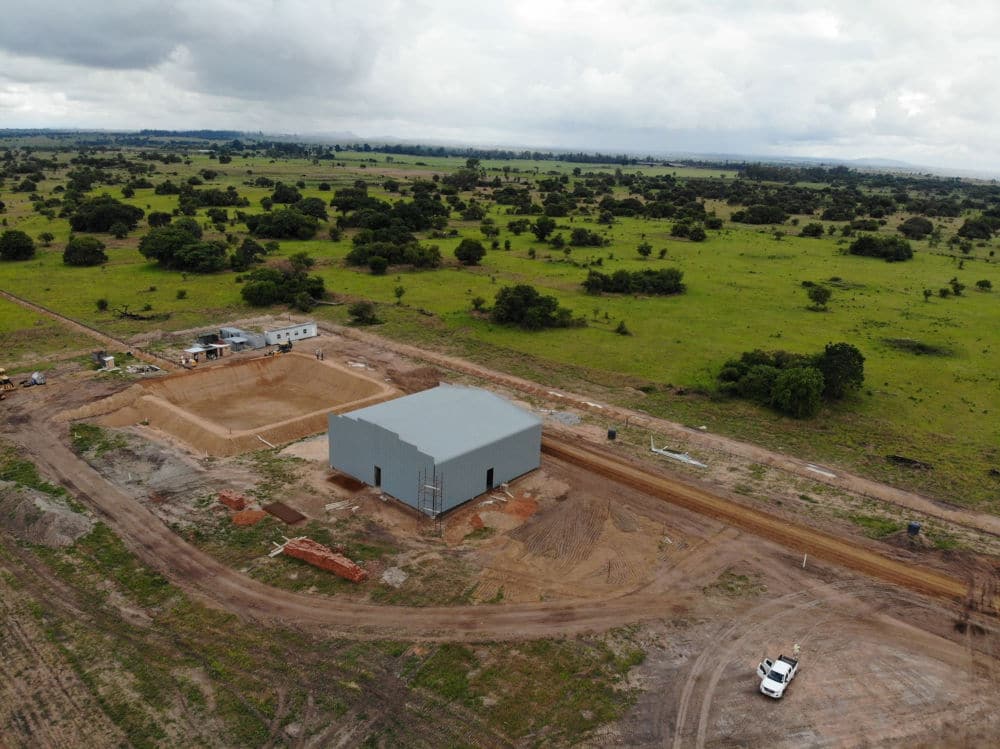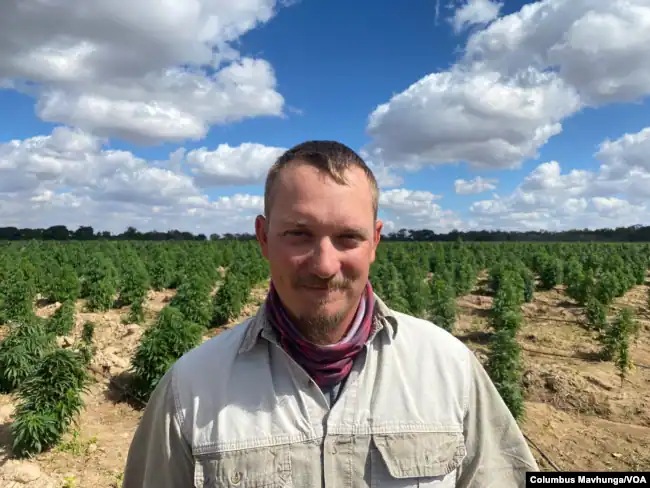
Estimated reading time: 8 minutes
During September this year, the Zimbabwe International Trade Fair was held in Bulawayo, Zimbabwe. The event was a shadow of its former self due to Covid-19 regulations, running over four days instead of its usual five.
Read about the South African cannabis industry.
Although a scaled-down affair in many respects, one exhibition stand created a buzz. Voedsel, a locally owned company that made its name in tobacco contracting and merchanting, debuted at the Bulawayo fair. But on this occasion, the company did not showcase the golden tobacco leaf for which it is known. It showcased a green cannabis leaf.
Diversification into cannabis production
“The public interest is not surprising,” said Sydney Siriro, Voedsel Cannabis project manager. “We are among the first to legally grow this crop. People are curious to find what this is all about. Cannabis is a valuable, multi-purpose crop with potential to generate wealth for the country.”
The Harare-based company represents a growing band of medicinal and industrial cannabis-growing businesses that have been establishing themselves since April 2018, when the government licensed the country’s first grower. By mid-October this year, 66 licences had been issued with more expected in the future as president Emmerson Mnangagwa’s government pushes for the country to benefit from the global rush for cannabis.

Voedsel has a licence to grow hemp (a cannabis species) and medicinal cannabis in Shamva, a prime growing zone in north-eastern Mashonaland Central Province. The company has 4ha of hemp in the open field and 3 000m2 of medicinal cannabis in greenhouses, said Siriro.
“This is our second year conducting trials,” he continued. “After the trials, which we are confident will be successful, we will target the European market. This is one crop that has multiple uses – from paper, clothing, cordage, edible oils, and medicine to stock feed.”
Zimbabwe was the second African country after Lesotho to legalise the growing of cannabis for medicinal and industrial use in April 2018.
Finance minister, Mthuli Ncube, projected that cannabis production could make a sizeable contribution to an economy that has been underperforming since 2000. He forecasted that the crop would replace tobacco as the country’s largest foreign-currency-earning agricultural product. On average, tobacco earns Zimbabwe US$1 billion (R14,5 billion) through exports mainly to Asia, the Middle East and Europe. However, Ncube expected at least US$1,2 billion (R17,4 billion) from cannabis this year.
Cannabis licences in Zimbabwe
According to the Zimbabwe Investment and Development Agency (ZIDA), a medicinal cannabis licence comes with a US$11 250 (R163 125) application fee. A successful applicant would then need to pay a hefty licence fee of US$46 000 (R677 000). Furthermore, applicants must provide proof of funds and a detailed security plan, and sign an agreement under which ZIDA commits, on behalf of the government, total protection of the investment against expropriation or changes in relevant governing legislation. A hemp cultivation licence costs US$200 (R2 900) and is renewable for the same sum.
Initial regulations demanded localisation of portions of the investments into cannabis and that cultivation should be done at prison, police or army farms. However, the provisions were relaxed to grant full business ownership to investors and freedom to choose where they want to grow it, as long as they meet stipulated security mandates.
The lure of cannabis production
ZIDA chief investment officer, Tinotenda Kambasha, said Zimbabwe has some of the best climate conditions to successfully grow cannabis and benefit from a global industry expected to grow in value from US$16 billion (R232 billion) to US$46 billion (R667 billion) by 2024.
The Tobacco Research Board (TRB), a government entity, reported recently that it is testing and propagating 15 varieties of cannabis to monitor their suitability and potency.

Apart from Voedsel, other prominent growers include United Kingdom-registered Eco-Equity, German agri-business giant Amathoen and the Zimbabwe Industrial Hemp Trust (ZIHT). The latter made history by being the first in Zimbabwe to be licensed and the first to grow the crop.
Zorodzai Maroveke, a dentist who studied in China, got to know more about hemp’s huge economic potential when she bought a dress made of the crop’s fibre in the Asian country. When she returned home in 2015, she founded ZIHT and started lobbying the Zimbabwean Government to consider legalising cannabis production. However, former president Robert Mugabe was not immediately convinced. She resumed her lobby when Mnangagwa came into office in 2017 and succeeded.
“It took a long time, almost four years of lobbying, but I am happy that the campaign was successful,” she said. “The economic value of cannabis is enormous, and the country stands to benefit immensely from it in terms of foreign currency earnings, investment, jobs and so on.”
Sowing the first cannabis seeds
In line with the regulations in place at the time, ZIHT first sowed the seeds of six hemp varieties at a prison farm just outside Harare in October 2019. The relaxation of the law enabled ZIHT to expand beyond the prison farm, said Maroveke. The trust now has 10ha of hemp at a farm in Headlands in eastern Manicaland Province and 5ha in Beatrice in the neighbouring Mashonaland East Province.

She estimates that the total land under hemp and medicinal cannabis is now 50ha across the country. Some of the farmers had been cultivating tobacco for years and are now incorporating cannabis.
Cannabis could replace tobacco
Shadreck Makombe, president of the Zimbabwe Commercial Farmers Union, wants more of their members to start trying their hand at cannabis farming.
“Cannabis is expensive to grow because it is heavily regulated for obvious reasons. Most of our farmers may not be able to grow it, but those who are able to have a chance of commercial success. However, cannabis is the way to go, especially for our members who produce tobacco, as tobacco-smoking is being discouraged worldwide for health reasons. This suggests that with time, there could be no one to smoke our tobacco, hence the need to switch to alternative crops, one of which is cannabis.”
Zimbabwe is Africa’s biggest tobacco-growing nation and number six in the world. The country produced 210 million kilogrammes this year, up from 184 million kilogrammes in 2020. An average of 120 000 households mainly grows Virginia flue-cured tobacco each year.
As the worldwide anti-tobacco lobby intensifies, the TRB is researching alternative crops that tobacco farmers are being encouraged to adopt. Cannabis and chia are among the high-potential crops being touted as viable options.
Success will not come overnight
While Zimbabweans’ hopes are high, Maroveke cautions that the anticipated cannabis-driven economic success will not come easily.

Growers will have to work hard to secure viable export markets, address compliance issues and mobilise the required top skills for marijuana growing and value addition locally. Maroveke adds that domestic processing capacity is crucial so that the cannabis sector does not end up in the same position as the tobacco industry. Zimbabwean tobacco growers lose much value by exporting up to 98% of leaves unprocessed. Only 2% of the locally grown crop is made into cigarettes at three factories in Harare.
“One big challenge is access to markets, especially in Europe,” she said. “It will not be easy as is commonly thought because Europe is also growing cannabis. We have to compete. Because it may not be that easy to secure foreign markets, there is a need for us to build a local market.” However, this may be difficult because there is nothing by way of local capacity to add value to cannabis. Market access is therefore the first challenge for growers. The second challenge relates to compliance issues. According to Maroveke, a good number of people who have received licences are still struggling with compliance.
The third major challenge encompasses research and development. Cannabis is a new industry about which there is still a lot to learn. This means a great deal more research is needed. This requires money, time and skills.
Lastly, for Zimbabweans to build a local market for hemp, much investment should be made into processing facilities. Cannabis undeniably has the potential to drive the economy, but there is still much to be done in order to compete with established markets, comply with regulations, learn and add value locally. – Ian Nkala, FarmBiz






